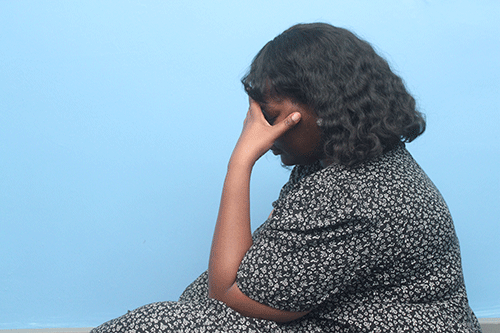Family and friends who understand that mental health issues can be treated will help patients overcome challenges and help them heal.
“I have been called names like ‘die mal ding’ (that mad thing), and other inhumane words, but I have learned to be resilient. Because of my condition, I have lost everything due to the depression that I had.”
These were the words of a mental health patient, recounting how she lost her full-time job as a civil servant, a blockage in the path of being patriotic and serving her country proudly.
*Mavis told Vital Signs that a lot of people do not take mental health seriously, with some perceiving it as something brought by witchcraft while it should be taken and treated like any other disease, with seriousness and professionalism.
“I was diagnosed with my problem in August 2018 and went to Okonguarri Psychotherapeutic Centre and from there, when I had relapses, I was admitted to the Windhoek Central Hospital at the psychiatry unit but it has been a long time since I had a relapse,” she recalled.
Mavis added that with the right support, especially from family, one can overcome a lot of challenges hence she decided to enrol at the University of Namibia, a mechanism she thought would be ideal to fight off depression.
Family and friends support is crucial when going through mental health issues and Mavis says her support structure was strong as they frequently visited her when she was hospitalised.
She said: “If your family and friends are strong for you and are supportive, you will be positive all the way. Everyone has a dream, to any other mental patient, don’t give up on your dreams because they can come true. Do not take your life or end it because there is hope for tomorrow, go back to the drawing board.”
*Shaun, another mental health patient in Windhoek undergoing treatment said sometimes life presents one with difficult obstacles that are hard to overcome and when that was evident in his life, it’s when he decided to seek help.
“Accept the fact that you are sick and you need help and once you accept that, everything will fall into place. I realised that I needed help because I didn’t want to talk to friends and family members, so I only had to consult a specialist,” said the 42-year-old.
“In a way, therapy has helped me. I am taking it one day at a time, it is a healing process and having the best support system is key,” shared the unemployed who has been undergoing therapy for four years.
A local soccer player who recently lost his mother said the toll and realisation of events surrounding that got to his mental wellbeing and he decided to seek therapy while his mental state was still intact.
“What made me seek therapy was the fact that I could not express myself fully on my own. I needed someone that understood the type of situation I am currently facing. The passing of my mom caused the mental breakdowns and depression. I pushed people away, people who are close to me due to reasons that I did not also understand,” said *Thomas.
He has been to therapy for a month now since her passing mid-year and cautions people going through a mental health crisis to keep moving, especially considering that the world does not stop for anyone.
“It’s not wrong to feel secluded, to feel emotional and suppressed. However, with the little energy we have, we can do something better for ourselves, to keep moving and keep us focused,” he told Vital Signs.
Psychotherapist Ceaseria Matiti said mental health conditions require ongoing, active management and a long-term commitment to recovery and slightly touched on the position of relapses in patients’ lives.
“Relapse takes place when symptoms of a condition reappear. This happens after a time with no symptoms. As devastating as it is, relapse is often a part of a person’s recovery journey,” she highlighted.
Matiti said stigma is one of the leading risk factors contributing to poor mental health outcomes. Stigma leads to delays in treatment.
“It also reduces the chances that a person with mental illness will receive appropriate and adequate care. The consequences of stigma can be serious and devastating. With stigma comes a lack of understanding from others, which can be invalidating and painful, but stigma also carries more serious consequences including fuelling fear, anger, and intolerance directed at other people,” said Matiti.
She encouraged: “If a friend or family member is showing signs of a mental health problem or reaching out to you for help, offer support by expressing your concern and support and remind them that help is available and that mental health problems can be treated. Educating other people so they understand the facts about mental health problems and by treating people with mental health problems with respect, compassion, and empathy.”
*Mavis, Shaun and Thomas are not their real names
– psiririka@nepc.com.na


